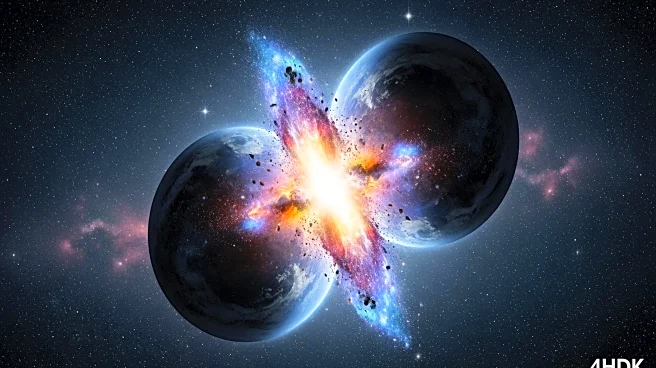What's Happening?
A recent study published in the journal Science Advances proposes that a cataclysmic collision between early Earth and a Mars-sized protoplanet, known as Theia, may have delivered essential ingredients for life to our planet. Theia, theorized to have originated further out in the solar system, was rich in volatile compounds such as hydrogen and carbon, which are considered building blocks of life. These volatiles were likely transported to Earth during the collision, which also contributed to the formation of the moon. Researchers used chemical models to analyze isotopes from meteorites and Earth rocks, focusing on the radioactive decay of manganese to chromium, to trace the first 15 million years of Earth's formation. This study provides insights into how life-supporting conditions may have developed on Earth, suggesting that similar conditions might be rare on exoplanets.
Why It's Important?
The findings of this study have significant implications for our understanding of life's origins on Earth and the potential for life elsewhere in the universe. By suggesting that essential life ingredients were delivered to Earth through a planetary collision, the study highlights the unique conditions that may be required for life to develop. This challenges the assumption that life-friendly conditions are common in the universe, indicating that exoplanets similar to Earth might not easily support life due to different volatile formation regions. The research underscores the complexity of life's emergence and the specific historical events that may have facilitated it on Earth, potentially influencing future studies in astrobiology and planetary science.
What's Next?
Further research is expected to explore the implications of Theia's collision beyond the delivery of volatiles. Upcoming studies, such as one slated for publication in the journal Icarus, suggest that Theia may have also contributed significant amounts of water to Earth's mantle, which remains a puzzle for geologists. This ongoing research could provide deeper insights into the geological and chemical processes that shaped Earth's early environment and its capacity to sustain life. Scientists may continue to investigate the role of planetary collisions in the development of life-supporting conditions on other planets, potentially guiding future explorations of exoplanets.
Beyond the Headlines
The study raises broader questions about the ethical and philosophical implications of searching for life beyond Earth. Understanding the unique conditions that led to life on our planet may influence how scientists approach the search for extraterrestrial life and the criteria used to identify potentially habitable worlds. Additionally, the research may prompt discussions about the long-term sustainability of life on Earth and the factors that could impact its future, including environmental changes and human activities.











